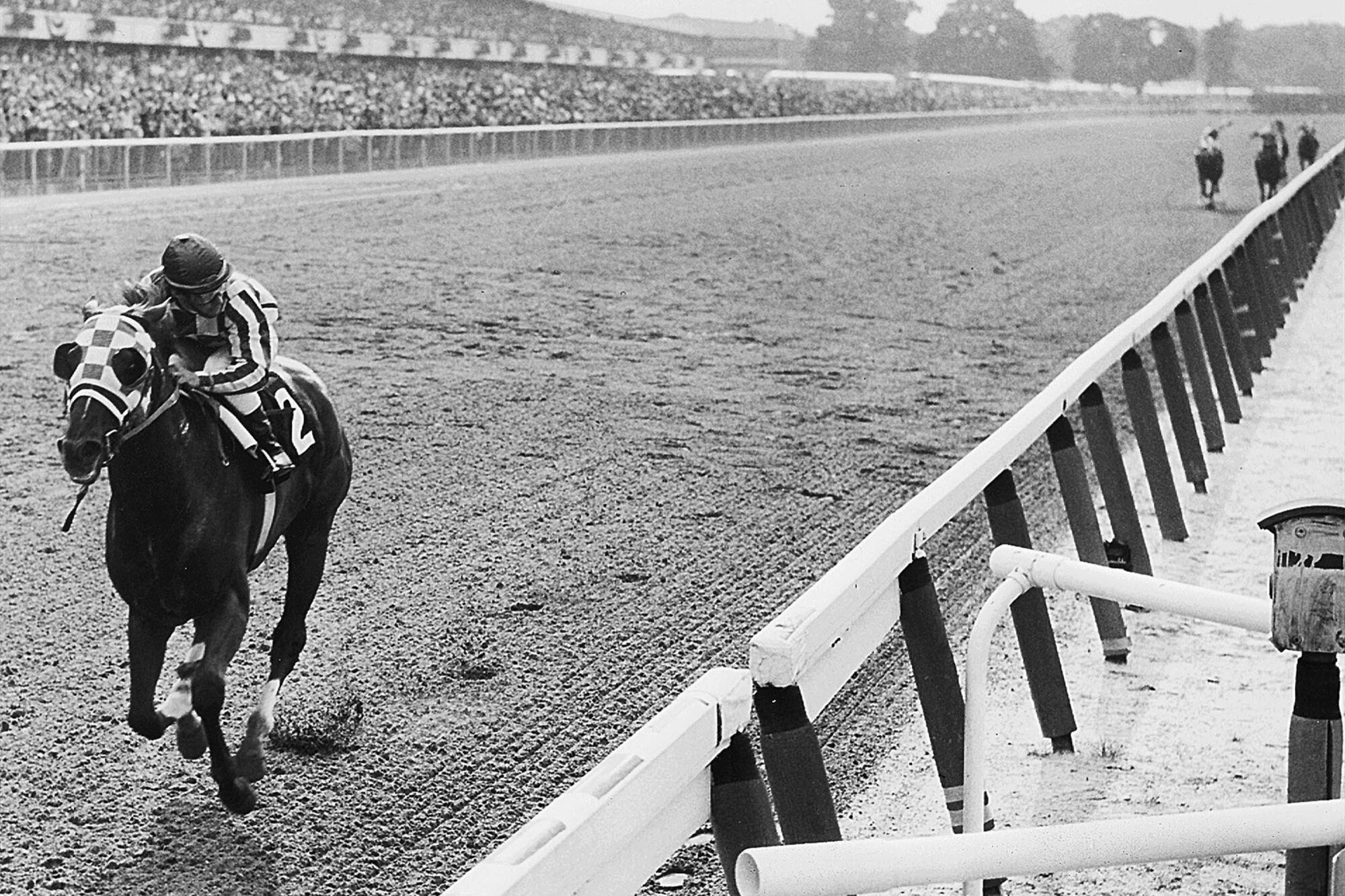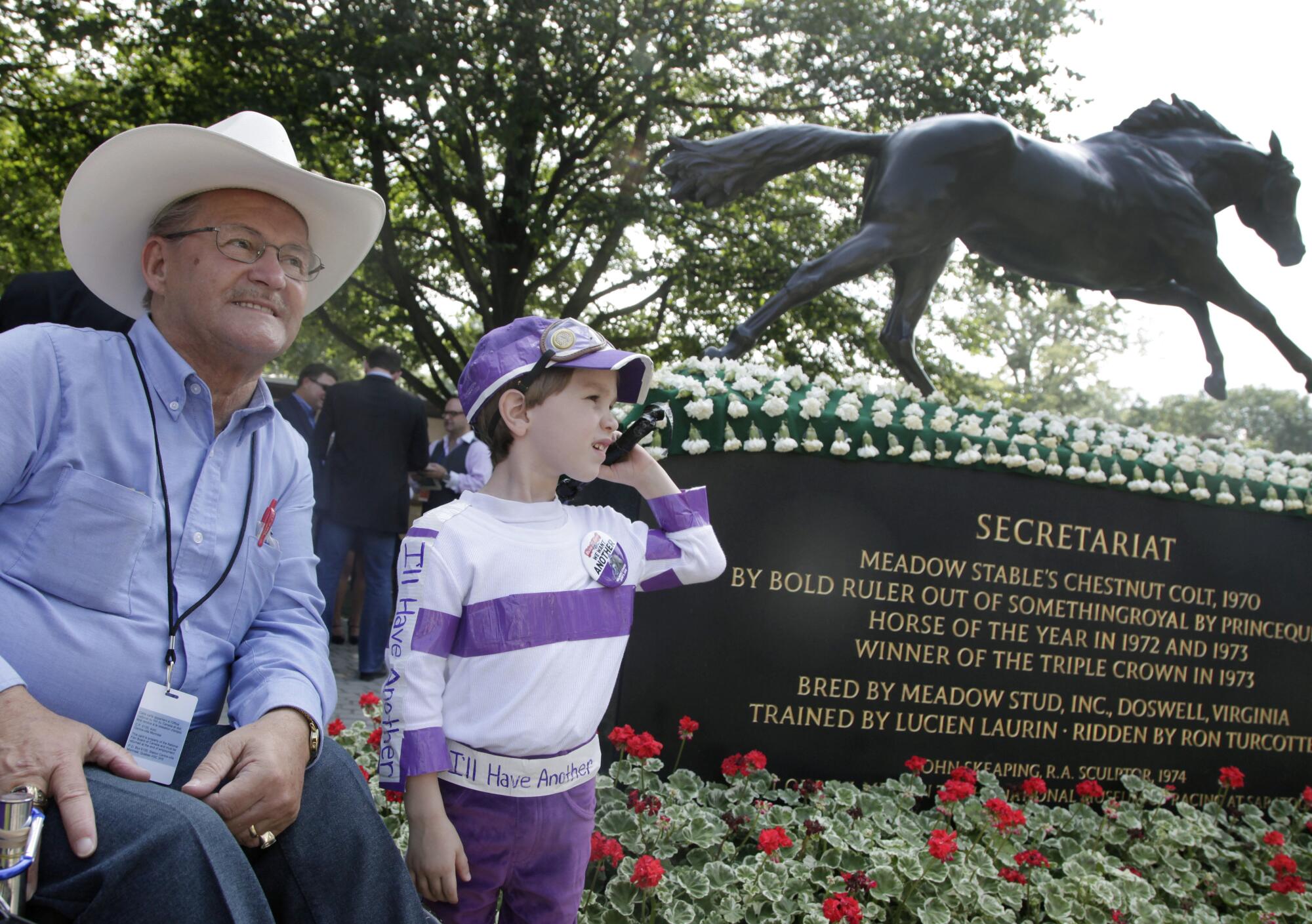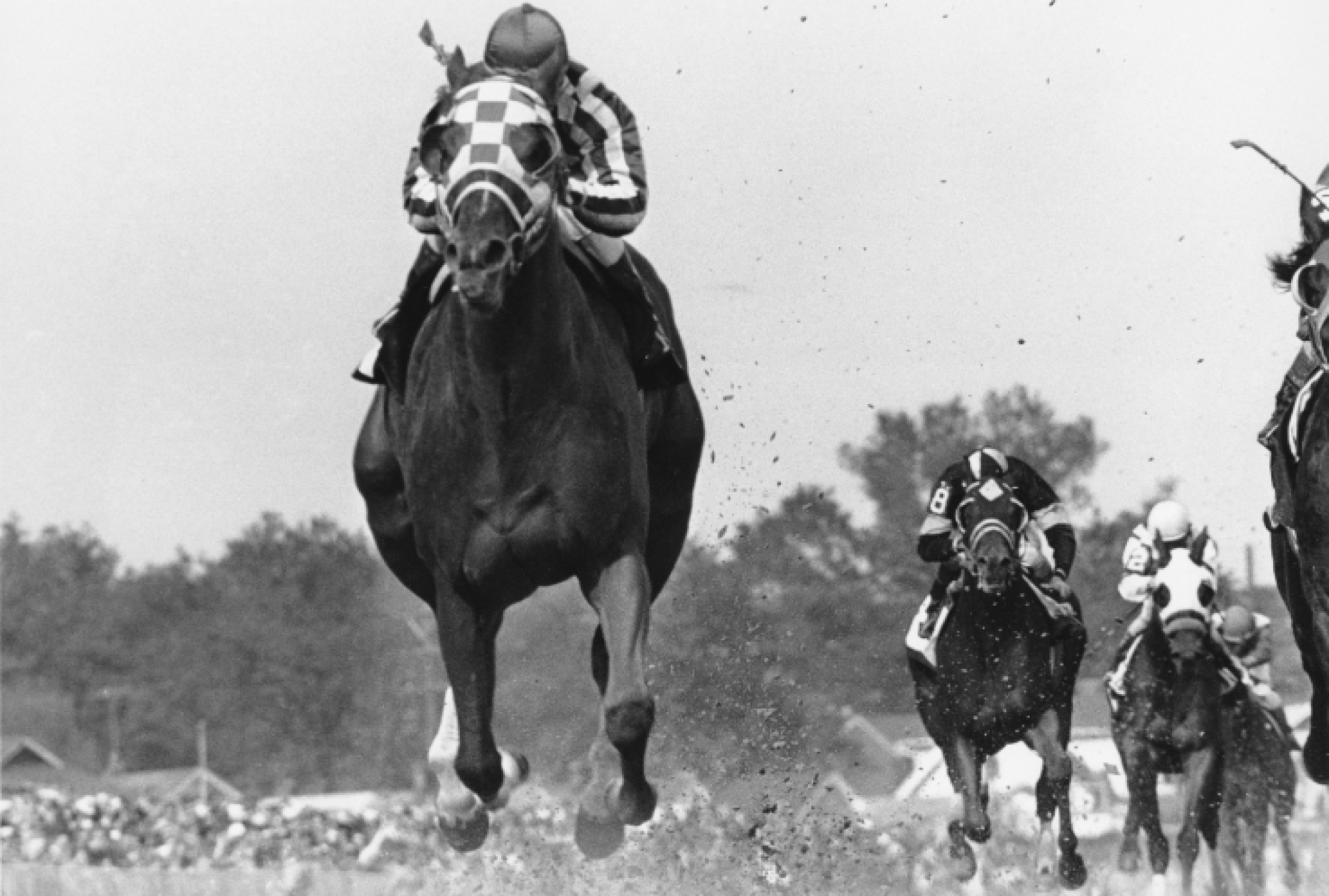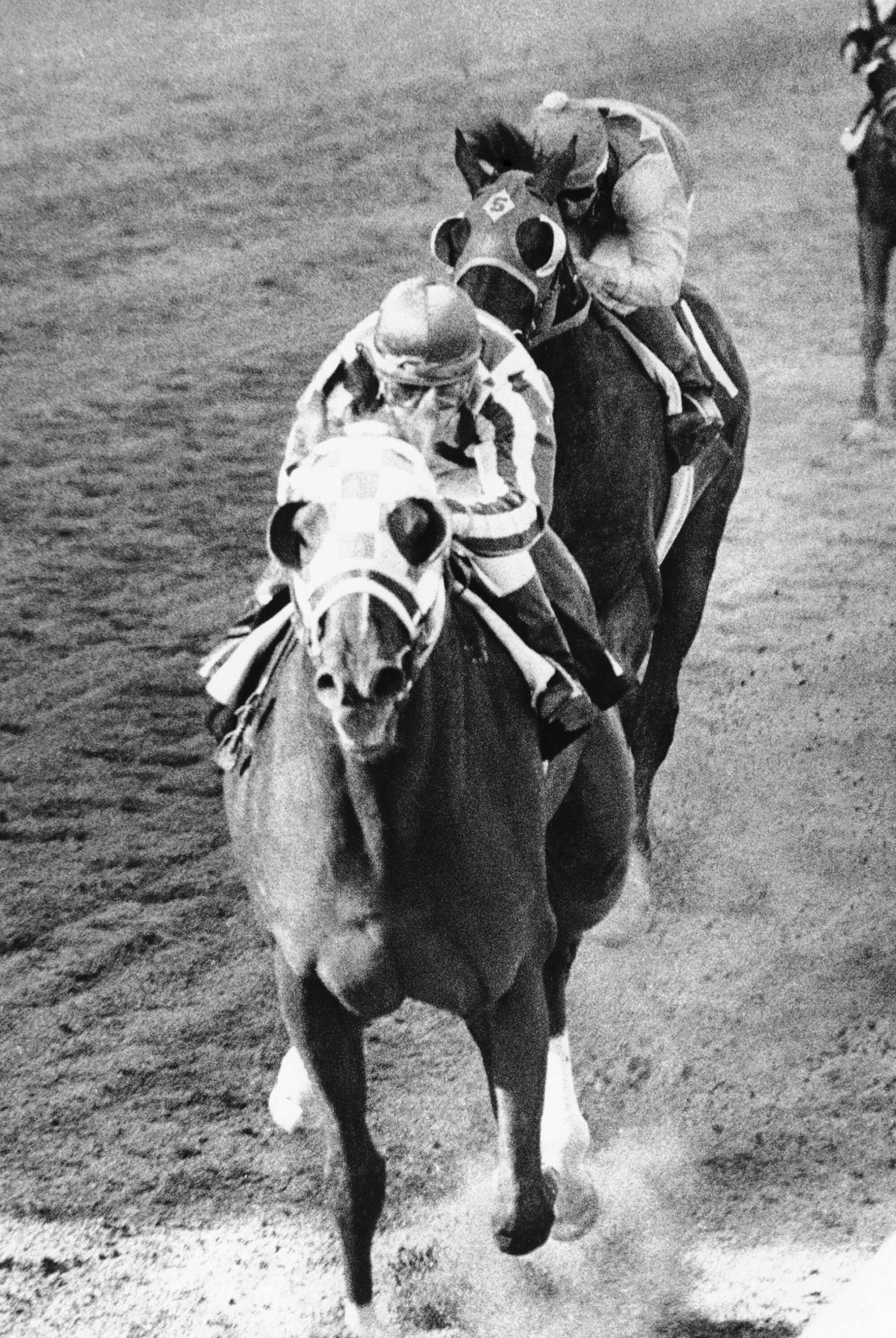
- Share via
There are moments in sports which forever embed themselves in the minds of those who watched it, either live or through an endless video loop.
There was Michael Jordan or Kobe Bryant bringing their teams back with furious fourth-quarter rallies. Muhammad Ali standing over a fallen Sonny Liston. Brandi Chastain’s celebration after winning the 1999 Women’s World Cup. Or Kirk Gibson hobbling around the bases after his pinch-hit home run in the 1988 World Series.
But the one that you can expect to see over and over for the next six weeks is the sight of jockey Ron Turcotte looking backward, with no one in sight, while riding Secretariat in the 1973 Belmont Stakes to win the Triple Crown.
“I can’t very well forget it because every time I go on YouTube it pops up,” Turcotte said last week.
This Saturday’s Kentucky Derby will be the 50th anniversary of the start of Secretariat’s Triple Crown run, a feat many thought at the time could no longer be accomplished.
“Secretariat’s Triple Crown sweep was widely celebrated at the time,” said racing historian Jon White. “But his feat actually looks even more phenomenal 50 years later, primarily because no horse has ever won the Kentucky Derby, Preakness Stakes and Belmont Stakes in faster times than he did.”
“When I got on him it was love at first sight and love at first ride. I told Lucien, ‘If we take it easy with this guy, we’re going to have fun.’”
— Jockey Ron Turcotte on riding Secretariat for the first time
Those records still stand today.
“Any time you see a great horse, you compare him to Secretariat,” said Mike Battaglia, who has done the Kentucky Derby morning line for almost 50 years. “Flightline, an unbelievable horse [last year], was so good but he only raced six times. But people were comparing him to Secretariat. He is the standard that you compare every other horse to. And they all fall short.”
Secretariat ran 21 times over a 16-month period. He crossed the finish line first 17 times, but had a win taken away by disqualification.
“[Trainer Lucien Laurin] ran him when he wasn’t at his best, when he had a high fever at Saratoga and he wasn’t ready to run in the Whitney Stakes,” said Turcotte, who rode the horse in all but his first two races and his final one. “The horse should have been undefeated except for those races and the first race when he got bumped.”
Turcotte, 81, is the only surviving major player in the legend of Secretariat. He lives on his farm in New Brunswick, Canada, after a riding accident in 1978 left him paralyzed. Laurin died in 2000 at 88. Owner Penny Chenery Tweedy died in 2017 at 95. Secretariat’s main groom and constant companion, Eddie Sweat, died in 1998 at 58.
The country may have never heard of Secretariat if it weren’t for some good racing luck coming from Meadow Farm in Virginia. It was the same cast of characters, Laurin, Turcotte and Chenery who engineered Riva Ridge to a successful 2-year-old campaign followed by winning the Kentucky Derby in 1972.
“In the fall of ’71 Riva won $500,000, that’s what saved the farm,” said Kate Chenery Tweedy, Penny’s daughter. “Because her brother and sister were saying if you don’t start making money, we’re going to sell the whole works. She said her dad was still alive and these are his horses and we don’t have a right to sell them, So, they sort of put her on a short leash. Had Riva not come along, we might not have had Secretariat. He was born but we probably would have sold him in a dispersal sale.”
American Pharoah is looking to find his place in history by becoming the 12th horse to win horse racing’s Triple Crown.
Christopher Chenery, Penny’s father, built Meadow Farm and owned Riva Ridge and Secretariat.
“Grandad was in the hospital, he’d been there [since 1968],” Kate said. “He hadn’t spoken or gotten out of bed. But mom tells the nurse to have the [Kentucky Derby] on, and she was pretty confident about Riva. It’s dinnertime, the nurse is feeding him, and the Derby is on. And at the end, the nurse says, ‘Mr. Chenery, your horse just won the Kentucky Derby.’ His left hand kind of lifts up and tears come down his eyes.
“For mom, that was everything. She thought anything else was icing on the cake. Riva loses the Preakness but wins the Belmont. Secretariat had not raced yet. Three weeks later he has his first race. I think they had hopes but really didn’t think lightning would strike twice.”
Secretariat’s impact on the sport was more than lightning, it was a natural phenomenon that enthralled the country. Leading up to the Belmont Stakes, the horse’s picture could be found on the cover of most major magazines. The television broadcast of the Belmont had 15 million viewers, more than half of all TVs at that time. Thirty-seven years later, the horse’s legend lived on in a Disney movie.
But before you get to the crowning moment you have to go back to the start, when Turcotte walks into the barn and sees this unraced 2-year-old.
“I asked Lucien, who’s the pretty boy you got there?” Turcotte said. “He asked me if I would work him, so I put my boots on and the saddle on and got on him. He just told me he was a horse that came from Meadow Farm and he was too pretty to be a race horse. When I got on him it was love at first sight and love at first ride. I told Lucien, ‘If we take it easy with this guy, we’re going to have fun.’”

Turcotte did not ride the colt his first two races, a fourth-place finish and a maiden win, because of previous commitments. Secretariat won eight straight races that year, although he was disqualified in the Champagne. He was voted Eclipse Awards as best 2-year-old Male and the more prestigious Horse of the Year.
It was at that point Penny Chenery sold the breeding syndication rights for $6.08 million, a record at the time.
“Mom was under huge amounts of stress in addition to losing her father (who died on Jan. 3, 1973, before Secretariat’s Triple Crown run) and she idolized him,” Kate said. “She was really scrambling. They had to come up with all this money for taxes. The movie shows her turning down a $7 million deal from Ogden Phipps. That didn’t happen. But she did turn down a $7 million deal from an Irish consortium, but she said I want to race him in this country. If they take him away, we’ll never see him in the Derby.
“She was savvy to negotiate to keep him racing even though they syndicated him, which meant we got to keep the purse money. That was a very gutsy thing to do and she felt like she could get it by asking for it. That was a hard line to draw and she did it.”
Secretariat, known as Big Red because of his size and color, opened his 3-year-old season with easy wins in the Bayshore and Gotham at Aqueduct. In his final prep before the Kentucky Derby, the Wood Memorial, he looked off his game and finished a dull third.
“I went to Kentucky and I didn’t like the way he worked the Saturday after the Wood,” Turcotte said. “I came back to New York to ride my commitment and I ran into Dr. [Manny] Gillman. He asked me how he was running. I said, ‘Doc, there is something, somewhere, he’s not himself. But he is sound, there’s just something wrong.’
“That’s when he told me about an abscess they discovered [under his top lip] before the Wood. Eddie Sweat never mentioned the abscess in between the last work and the next one. Now, I felt better after Dr. Gillman told me. I said, ‘Thank you doc, you just solved my problem.’”
“Any time you see a great horse you compare him to Secretariat. ... He is the standard that you compare every other horse to. And they all fall short.”
— Mike Battaglia, who has done the Kentucky Derby morning line for almost 50 years
The loss in the Wood Memorial took some of the luster off of Secretariat but few knew the reason for his losing performance.
“That loss didn’t bother me,” Battaglia said. “I just thought his stablemate, Angle Light, went out and set the pace and nobody went with the horse and there were really slow fractions and with the late run he just never got there. As a handicapper, I threw the race out. I knew nothing about the abscess, I didn’t hear about that until much later.”
It was on to the Kentucky Derby but it is difficult to get a good ticket, even if you were family. Daughter Kate was relegated to the kids table, except there was no kids table at Churchill Downs or the Preakness.
“Politically, mom had to mollify her brother and sister,” Kate said. “They didn’t really get along that well. Uncle Hollis was working for the World Bank and he had to have his boss at the time, Robert McNamara (former U.S. secretary of defense), be there. That’s an example of why we didn’t get to go because other prominent people did.”
Putting the family drama aside, Turcotte, confident as always, decided to take a nap before the Derby but woke up to a nightmare.
“I woke up, or thought I did, and there was a picture of the Wood Memorial on the TV screen,” Turcotte said. “I thought it was real and I had lost the Derby, but then I realized it was just film of the Wood. I took a shower and got dressed for the race.”

There was no nightmare for Secretariat despite breaking last. The Derby is always a big question mark because it is the first time a horse runs 1 ¼ miles but not for Big Red.
“I told [Lucien] not to worry about the last quarter [of a mile],” Turcotte said. “I’ll gallop him the first quarter, which is what I did. I took him back to last and just galloped him and then I started letting him pick off other horses. He was doing beautiful. He was into the bit and everything was the way I wanted.”
Secretariat won by 2 ½ lengths bringing more confidence to Turcotte.
“When reporters asked me about the Triple Crown, I told them it was downhill from here,” he said. “I would say the Derby is the toughest because you’re running against horses you’ve never encountered before. That’s the hardest one. The Preakness is the easiest.”
Secretariat made the Preakness look easy with a wide sweeping move around the first turn. The small field of six made things less complicated but still such an early move could have used up a lot of energy and Secretariat could have faltered in the stretch. Not a chance. He glided home to another 2 ½ length win.
“That run in the Preakness still blows me away,” Kate said. “I think it was better than the Belmont because he passed that whole herd on the first turn. I loved that race and it was fun to watch on TV because you could really see it.”

No horse had won the Triple Crown in 25 years, so despite Secretariat’s greatness there were doubters based only on history. But those who saw the race had never seen such dominance from any horse.
“I couldn’t hear the announcer all the time, saying how far I was in front,” Turcotte said. “I knew I was quite a ways in front because I couldn’t hear any other horses hitting the ground behind me. When I got the quarter pole I looked and I could barely see them and I looked at the clock and saw 1:59 on the board, which was faster than we ran the Derby.
“He was galloping long strides so I just kept him in motion. I only knuckled down on him 10 jumps from the wire because there was somebody above the wire in the starter’s stand. He had bright-colored pants and the wind was blowing so I didn’t want him to be spooked. That’s the only reason I did that, not for more speed, he was doing everything else.”
White, who also does the morning line at Santa Anita and Del Mar, tried to put the race in perspective.
“He was ‘moving like a tremendous machine,’ as Chic Anderson said during his iconic call of the race for CBS,” White said. “Running up the score even more in the stretch, Secretariat ultimately reached the finish 31 lengths in front while obliterating Gallant Man’s track record by 2 3/5 seconds. Many believe Secretariat’s Belmont to be the greatest performance in the history of American racing.”
Secretariat ran six more races after the Belmont, winning four of them, before retiring at the end of his 3-year-old season. He went on to be a successful stallion with A.P. Indy and Storm Cat among his progeny, two of the all-time best at producing winners.
Secretariat died in 1989 at 18 years old. He was diagnosed with laminitis, a painful condition in which the hoof is no longer able to adequately support the leg bones.
Justify etched his place in racing history on Saturday when he became the 13th horse to win the Triple Crown.
People have speculated what made Secretariat so good. The question was answered in the necropsy. An average horse has a heart of about 8.5 pounds. Secretariat’s was estimated to be about 22 pounds, making his ability to process oxygen so great that stamina would never be a problem.
His legacy, though, remains even bigger than his heart.
More to Read
Go beyond the scoreboard
Get the latest on L.A.'s teams in the daily Sports Report newsletter.
You may occasionally receive promotional content from the Los Angeles Times.











